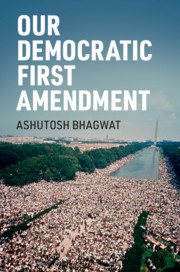Book contents
- Our Democratic First Amendment
- Our Democratic First Amendment
- Copyright page
- Dedication
- Contents
- Acknowledgments
- Introduction
- Part I The Framers’ Democratic First Amendment
- 1 Freedom of Speech and of the Press
- 2 Assembly and Association
- 3 The Petition Clause
- 4 Cognate Rights and Democratic Citizenship
- Part II The Democratic First Amendment in the Age of Twitter
- Index
3 - The Petition Clause
from Part I - The Framers’ Democratic First Amendment
Published online by Cambridge University Press: 28 May 2020
- Our Democratic First Amendment
- Our Democratic First Amendment
- Copyright page
- Dedication
- Contents
- Acknowledgments
- Introduction
- Part I The Framers’ Democratic First Amendment
- 1 Freedom of Speech and of the Press
- 2 Assembly and Association
- 3 The Petition Clause
- 4 Cognate Rights and Democratic Citizenship
- Part II The Democratic First Amendment in the Age of Twitter
- Index
Summary
Chapter 3 examines the Petition Clause of the First Amendment. Petitioning is the oldest of the rights of the Democratic First Amendment, with roots in pre-Norman England and given explicit protection in the Magna Carta in 1215. It originated as a means for individuals to seek redress from the king for private harms. During the seventeenth and eighteenth centuries, however, it evolved into a means for citizens, generally acting in groups, to seek changes in public policy from the legislature. As such, petitioning was an essential element of democratic governance in America during the colonial era and the early Republic. It was a crucial means for citizens to bring their concerns to the attention of their elected representatives in between elections, and the only means for citizens who could not vote – which during this period meant the majority of citizens — to influence their government. Furthermore, during this period American legislatures felt an obligation to respond to properly filed petitions. Petitioning declined during the years leading up to the Civil War, however, and in our modern democracy it unfortunately plays a relatively trivial role.
- Type
- Chapter
- Information
- Our Democratic First Amendment , pp. 67 - 80Publisher: Cambridge University PressPrint publication year: 2020

